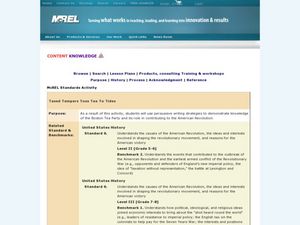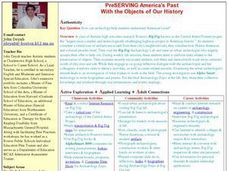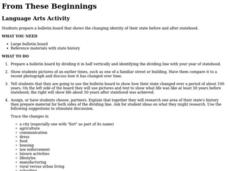Curated OER
Community Building
Students explore the issues of urban and suburban sprawl. They work in small groups to create their own planned communities.
Curated OER
Immigration: A Cultural Perspective
Students investigate immigration and migration patterns near Pittsburgh, and distinguish between voluntary and involuntary migrants. They evaluate the importance of urban villages in relation to the immigrant experience.
Curated OER
Populists and Progressives
Students study the Gilded Age in American History. They present a speech demonstrating knowledge of the platforms of the Progressives and Populists.
Curated OER
Aboriginal Statistics
Fourth graders analyze statistics of Native Americans by creating graphs. For this data analysis lesson, 4th graders define different statistical terms and practice finding those statistics from groups of numerical information about...
Curated OER
The Student Non-Violent Coordinating Committee
Students identify and analyze the motivation behind the African-American students in organizing the sit-in if Greensboro and the formation of the SNCC. Students identify how the generational differences between members of SNCC and other...
Curated OER
Taxed Tempers Toss Tea To Tides
Engage learners in persuasive writing, research, and creative thinking. They research the series of events that led to the Boston Tea Party and create brochures that include propaganda intended to rally Patriot support or dissuade...
Polk Bros Foundation
Chicago: Choices and Changes
Chicago, a city that is ever changing. A thought-provoking lesson, geared toward third-grade social studies, explains how the city of Chicago has changed over time. It discusses important leaders to the founding of the city, like Daniel...
Benjamin Franklin Tercentenary
Franklin’s Philadelphia: Another Point of View
The impressive story of Benjamin Franklin, including his rise from a printer’s apprentice to a statesman, color upper-level scholars’ understanding of the possibilities of life in colonial Philadelphia. But not everyone had the...
Curated OER
A Revolutionary Idea!
Fifth graders explore the Industrial Revolution. They examine the early gristmills and sawmills. Students explain why they were necessary and helpful in the lives of early Americans.
Curated OER
Social Studies: Exploring Boston's Big Dig
Students, in a high school class for autistic children, take a virtual tour of Boston's "Big Dig" and the artifacts discovered there. During weekly lab sessions, they discover the processes involved in artifact preservation. Using...
Curated OER
Focused Learning Lesson: American History
Eleventh graders compare and contrast the type of immigrant that came to America during the 19th and 20th centuries. They write letters as if they were immigrants coming to America and what they faced and their hopes for the future.
Curated OER
Location of Cities 201
Students work in pairs to locate the ancient cities on a world atlas using the longitude and latitude measurements. They examine the physical and human futures that explain their locations.
Curated OER
Consequences of Garbage
First graders consider the problem of too much garbage in America. In this garbage use activity, 1st graders discuss ways to decrease garbage in the United States and complete a coloring sheet.
Curated OER
The Cost of Community Services
Students identify the types of services provided to citizens by local government and evaluate tax revenue versus the costs of delivering these services to developments. They evaluate the advantages of spatial relations to delivery of...
Curated OER
Linking the Past with the Present
Fifth graders explore how Africans built South Carolina into an economic giant. They write an expository paper explaining how Africans and their descendants built the rice empire along the Carolina coastline. They write a persuasive...
Curated OER
From These Beginnings
Students prepare a bulletin board that shows the changing identity of their state before and after statehood.
Curated OER
Civilizations of the Americas
Study and compare multiple aspects of both Aztec and Inca civilizations. Young historians explain how each of the empires came to be, and how they were both defeated by the Spanish. The resource starts out as a good lesson, but is...
Curated OER
Immigration and Urban Life
Fifth graders research the impact of immigration. In this social studies instructional activity, 5th graders discuss how immigration affected the economy. Students discuss the living and working conditions of immigrants in the 1800s.
Curated OER
A Twist On American Symbolism
Students discover how and why flag and national anthem of the United States were created, and in what ways they represent the foundation of our national identity.
Curated OER
The Call to Greatness: A Search for Moral Integrity in the Urban Classroom
Eleventh graders read a variety of novels surrounding the theme of "greatness." In groups, they discuss various aspects of each novel and create a group bulletin board to identify and display the most important information from the...
Curated OER
Country Mouse, City Mouse?
Students recognize the characteristics of a rural area. They analyze land use to determine whether the map is of a rural (country) area or an urban (city) area.
Curated OER
Having Fun: Leisure and Entertainment at the Turn of the 20th Century
Students inquire about the history of enterntainment and flim. The development of the modern industry of entertainment is done from reflecting upon its roots and background. The discussion is leading to answering how Americans have...
Curated OER
Social Studies: Cultural New Orleans
Students observe the PBS film, "New Orleans," to explore such topics as race relations, cultural history, and urbanization. After examining n interactive map displaying the city at various dates in its history, students role-play as...
Curated OER
Finding Comfort in an Unfamiliar Landscape
Students recognize the writings of a prominent American writer. They analyze written text making connections to personal prior experience. Students discuss in small and large groups their findings. They organize ideas in writing using...

























